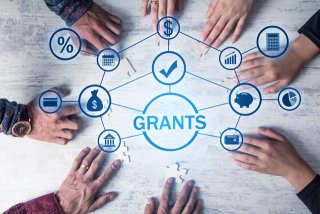Promoting Readiness and Enhancing Proficiency to Advance Reporting and Data (PREPARED) Cooperative Agreement
Proposals

The EPA anticipates announcing award recipients of the 2nd round of the PREPARED cooperative agreement competition in the first quarter of calendar year 2025.
Overview of PREPARED

The EPA launched PREPARED to provide technical assistance to EPA grant recipients representing small, rural, limited capacity, and/or Tribal communities to enhance their capacity to meet data and reporting requirements and improve their ability to generate the information necessary to evaluate and improve grant outcomes. The EPA anticipates awarding up to $4 million over 3 years to as many as 8 recipients. A brief overview of the grants awarded in round one is detailed under “Active Projects”. These grantees represent approximately $2 million dollars of the available funding.
Data, reporting, and evidence-building are vitally important responsibilities for EPA grant programs. However, many EPA grant recipients face capacity challenges in engaging in these activities. Many small, rural, low capacity, and/or Tribal communities that are eligible for EPA grants sometimes choose to pass on funding opportunities as a result. With this cooperative agreement, the EPA seeks to fund technical assistance providers with program evaluation expertise to equip communities with strategies, tools, and training that enhance their capacity for data, reporting, and evidence-building.
Active Projects
University of Massachusetts Dartmouth
The University of Massachusetts Dartmouth (UMass) is a public institution of higher education located at the southeastern corner of Massachusetts and part of the University of Massachusetts five-system campus.
The UMass project will build community capacity on evidence-based approaches to advance data dissemination, reporting, and integration of lived community experiences for EPA and State Revolving Fund (Clean and Drinking Water Programs) applicants and grantees. The program will provide an innovative approach to integrate qualitative data and community experiences through participatory storytelling.
Program activities will focus on developing capacity-building resources to increase community preparedness to apply for grants, manage/collect/analyze data, and report results to the EPA/state agency. UMass will develop a data collection methodology based on quantitative and qualitative indicators together with an online, accessible database. Additionally, UMass will create and evaluate a pilot online platform for automated reporting for improving efficiency on data reporting, helping streamline reporting for EPA grantees.
UMass’ program activities will become available to program beneficiaries through technical assistance, program outreach, and community engagement. The project will include a robust program evaluation to serve as model for program beneficiaries conducting performance measurement and evaluation plans for continuous learning and improvement. The anticipated program outcomes include:
- Increased capacity of participants to apply for and manage EPA grants and SRF programs
- Improved data collection and reporting compliance for EPA grantees or SRF recipients
- Sustainable environmental planning and engagement for communities
- Reduced environmental burdens in New England communities
Palmetto Futures
Palmetto Futures is a nonprofit organization based in Cary, North Carolina, that advances forward-thinking strategies to address communities’ needs and remove barriers to information, resources, and funding.
The Palmetto Futures project will provide comprehensive capacity-building support to community-based organizations (CBOs) in the Gullah Geechee corridor. Palmetto Futures’ initiative will focus on bolstering local organizations' capabilities to manage federal projects by improving data proficiency and project reporting. Additionally, this project will conduct community engagement with organizations in the Gullah Geechee Corridor in coordination with their partner organization, the Gullah Geechee Chamber Foundation. The Gullah Geechee Chamber Foundation is a nonprofit based in the Gullah Geechee Corridor with a mission focused on raising awareness and sustainability for African American businesses and other entities that impact the Gullah Geechee community.
Program activities will focus on equipping CBOs with the skills needed to successfully apply for EPA funding, design impactful projects, effectively manage performance and budgets, and carry out rigorous project evaluations. Palmetto Futures’ project will offer expert-led workshops (both in person and virtually), technical assistance, and collaboration with other technical assistance providers like the Thriving Communities Technical Assistance Centers (TCTACs). The anticipated program outcomes include:
- Economic benefits in the Gullah Geechee Corridor
- Increased community engagement with state/federal environmental agencies and CBOs
- Improved reporting and data dissemination by program beneficiaries
- Increased applications to EPA funding opportunities from CBOs in the Gullah Geechee Corridor
"With the EPA’s support, we can implement robust programs that not only address immediate environmental challenges but also build long-term sustainability" said Kibri Everett, Executive Director of Palmetto Futures.
New Growth Innovation Network
New Growth Innovation Network (NGIN) is a non-profit advancing economies in US cities and regions, ensuring all communities lead, shape, and benefit from economic growth.
The NGIN project will build individual, organizational, and collective capacity for would-be recipients of EPA funds in small, rural, underserved, and/or Tribal communities on data, reporting, and evidence-building so that they are equipped to apply for future EPA grant opportunities and meet the data collection, evaluation, reporting requirements of their EPA grant.
NGIN’s program activities include (1) Engagement and Listening, to deepen the understanding of barriers faced by the communities (2) Outreach and Capacity Building, to develop and deliver a targeted virtual training for 30 sites and support implementation of data plans in six small, rural, low capacity, and/or Tribal communities (3) Playbook Creation and National Knowledge Sharing, to launch a playbook distilling insights from the training and program, and share tools nationally for public benefit. The anticipated program outcomes include:
- Increased data fluency for low capacity communities
- Increased ability for environmentally burdened communities to access EPA funding
- Increased compliance with EPA reporting requirements
Academy of Natural Sciences of Philadelphia
The Academy of Natural Sciences of Philadelphia is a nonprofit leading natural sciences institution dedicated to understanding the natural world.
The Academy of Natural Sciences’ technical assistance program will build the capacity of communities in the Philadelphia metropolitan area and across Pennsylvania with developing and evaluating data, building evidence, and reporting results, thereby bolstering their ability to successfully pursue EPA grants. The tools and trainings developed for this process will then be made available for use by organizations over a wider scale. Through workshops and community engagements, The Academy of Natural Sciences and the partner communities (numerous local governments and community based organizations) will develop tools and trainings that are structured to allow non-burdensome pathways for communities to evaluate and report on EPA grants, including accessible training modules, group workshops, and easy-to-use web interfaces.
Roundtable Discussion
On August 29, 2023, EPA hosted an online roundtable conversation that featured speakers from four organizations that serve small, rural, and/or underserved communities that receive EPA funding (a fifth speaker contributed comments in advance). Speakers and attendees were invited to share feedback and ideas on ways that funding reporting requirements can both help and hinder their activities.
All are strongly encouraged to review the PREPARED Community Roundtable Summary (pdf) .
FAQs
Q: The PREPARED cooperative agreement and the TCTAC (Thriving Communities Technical Assistance Centers) are both providing technical assistance, what’s the difference between the two?
A: The PREPARED program and EPA’s EJ TCTAC (Thriving Communities Technical Assistance Centers) are both providing technical assistance. However, the PREPARED effort is a very targeted approach in that it will support up to 8 organizations with expertise to specifically assist communities with evidence building activities while the EJ TCTACs are providing fundamental technical assistance to support participants interested in accessing federal funding by creating a federal portal, identifying a grant vehicle, putting together a competitive application, managing a grant, creating partnerships among a list of their top priorities.
PREPARED recipients will deliver technical assistance that directly relates to the delivery of training or development of tools for evidence building and program evaluation activities such as planning, priority setting, data collection/management, measurement, primary and secondary data analysis, and dissemination of findings. PREPARED has a narrow focus on skills development and maintenance, and we anticipate that as a result of these efforts, community beneficiaries will not only be able to use data more efficiently for their own story telling, but also well equipped to respond to federal grant reporting and evaluation requirements.
While the PREPARED program is focused on evidence building, data collection, and related skills development, the TCTAC program is focused on the provision of training to build overall capacity for navigating federal grant application systems, developing strong grant proposals, and effectively managing grant funding. These two types of programmatic technical assistance are very different with their intentions. The PREPARED program is a steppingstone and it is anticipated that the skills developed through this program will better situate community beneficiaries to work with more specialized forms of technical assistance that could be identified through a TCTAC provider.
As indicated in the PREPARED Notice of Funding Opportunity, EPA will work with PREPARED recipients to ensure that their projects complement but do not duplicate the efforts of TCTAC recipients.
Contact
Submit all questions/inquiries to the Evidence and Evaluation Team.
